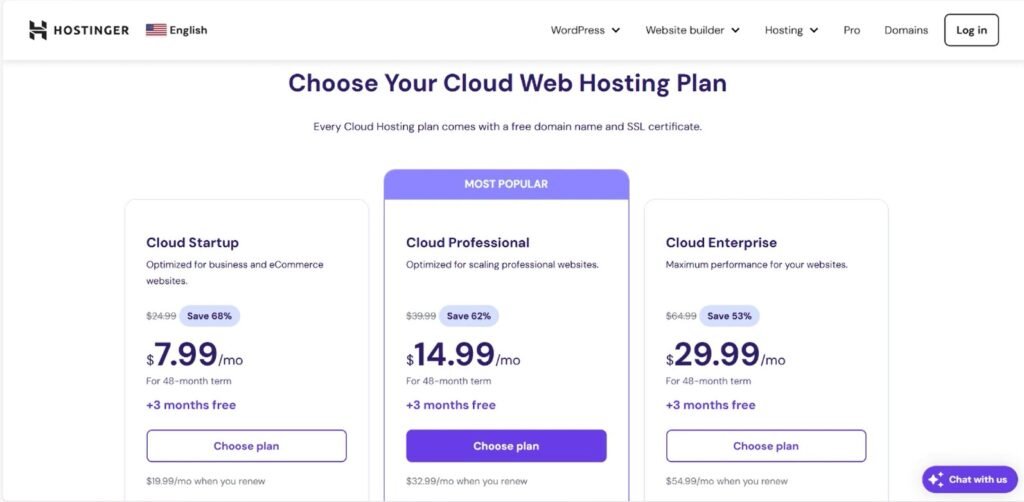Last Updated on November 13, 2025
For startups, the early days are full of excitement, uncertainty, and constant budget pressure. Every decision feels critical because the wrong choice can drain valuable resources and slow down growth. Among these decisions, choosing the right hosting solution is often underestimated, but it directly impacts performance, customer trust, and scalability.
Traditional hosting models like shared or dedicated servers may appear affordable, but they come with serious limitations. Shared servers can slow down when multiple websites consume resources, while dedicated servers are expensive and inflexible. Startups need something better—something that balances affordability with flexibility. That’s where cloud hosting comes in.
Cloud hosting distributes a startup’s applications and data across a network of servers instead of relying on a single machine. This setup ensures stability, quick scalability, and improved performance, all while keeping costs under control. For a young business trying to build credibility, those advantages are priceless.
To put it simply, cloud hosting is not just about running a website—it’s about creating a foundation for growth. For a startup preparing to scale, reach customers globally, and handle unpredictable traffic, cloud hosting becomes the smarter choice.
Key reasons startups are turning to cloud hosting:
- It eliminates heavy upfront infrastructure costs.
- It allows flexible, pay-as-you-go pricing that fits lean budgets.
- It ensures reliability and uptime, which builds customer trust.
In short, cloud hosting gives startups the confidence to focus on innovation rather than worrying about downtime or overspending on IT.
Understanding Cloud Hosting and Its Relevance for Startups
Cloud hosting is a modern hosting model where websites, apps, and data are stored on a network of virtual servers rather than being tied to one physical machine. This design offers flexibility, speed, and reliability that older hosting methods struggle to provide. For startups—where budgets are tight but ambitions are high—this makes all the difference.

Unlike traditional shared hosting, where multiple users compete for the same resources, or dedicated hosting, which demands high upfront costs, cloud hosting delivers a balanced approach. Resources are allocated dynamically, so startups pay only for what they use while gaining the power to scale instantly when demand rises.
Imagine a new startup launching an e-commerce site. In the first month, traffic may be low, but after a viral marketing campaign, visitors could surge overnight. With traditional hosting, this sudden growth could lead to server crashes and unhappy customers. Cloud hosting, however, expands resources automatically, ensuring the website stays fast and reliable even during unexpected spikes.
Why cloud hosting suits startups particularly well:
- Pay-as-you-go affordability – Startups avoid paying for unused capacity.
- Scalability on demand – Resources grow or shrink in real time based on need.
- High uptime and availability – Distributed servers reduce the risk of downtime.
For startups navigating unpredictable growth, cloud hosting is more than just a technology upgrade. It’s a strategic choice that provides both stability and freedom, allowing young companies to innovate without being held back by infrastructure limits.
Benefits of Affordable Cloud Hosting for Startups
For startups, every dollar saved can be reinvested in growth. Affordable cloud hosting isn’t just about cutting costs—it’s about gaining access to powerful tools that make scaling possible. When chosen wisely, it becomes a backbone for innovation and customer trust.
One of the most important advantages is cost efficiency. Unlike traditional hosting, which often requires large upfront payments, cloud hosting operates on a subscription or pay-as-you-go basis. This gives startups the freedom to start small, pay only for the resources they use, and gradually increase investment as revenue grows.
Another crucial benefit is scalability. Startups often experience unpredictable growth. A product may stay quiet for months before suddenly attracting thousands of users. Cloud hosting adapts in real time, providing additional CPU, storage, or bandwidth when needed and scaling back when demand slows down. This prevents both underperformance and overspending.
Reliability is also central. Affordable providers still offer service-level agreements (SLAs) with uptime guarantees, usually above 99.9%. For a startup, downtime means more than just lost traffic—it can mean lost credibility. A stable cloud environment ensures customers have continuous access to apps, websites, or services.
Security is another area where cloud hosting excels. Many providers offer encryption, firewalls, and automated backups as standard, helping startups protect sensitive data without hiring a large IT team. This is particularly valuable for companies handling customer payments or personal information.
To summarize, affordable cloud hosting offers startups:
- Lower infrastructure costs without compromising quality.
- Flexibility to grow at the pace of business demand.
- High availability and uptime, ensuring customer trust.
- Built-in security tools to safeguard data.
- Global accessibility, enabling teams to collaborate from anywhere.
For startups determined to stretch every resource, affordable cloud hosting creates an environment where innovation can thrive while costs stay under control.
Choosing the Right Cloud Hosting Provider
Selecting a cloud hosting provider is one of the most important decisions a startup can make. The right choice can support growth and reduce costs, while the wrong one can create technical and financial headaches. Instead of rushing into the cheapest plan available, startups should weigh several critical factors before committing.
1. Pricing Transparency
Low headline prices often hide extra charges. Some providers bill separately for bandwidth, storage, or premium support. Startups should always look beyond the entry-level cost and calculate the true monthly expense. A predictable billing model is far better for budgeting than one filled with hidden fees.
2. Scalability Options
A startup might not need massive computing power on day one, but growth can come suddenly. The best providers make it easy to add storage, RAM, or servers instantly. Without strong scaling options, a sudden traffic spike could lead to downtime or lost sales.
3. Performance and Reliability
Speed matters. Websites that load slowly frustrate users and drive them away. A reliable provider should guarantee high uptime (at least 99.9%) and deliver quick response times globally. For startups, this reliability directly translates to customer trust.
4. Customer Support
Most startups lack a dedicated IT team. When problems arise, responsive support becomes essential. Providers that offer 24/7 live chat or ticket systems can be lifesavers during critical issues. Poor support, on the other hand, can cost both money and time.
5. Integration and Ecosystem
Startups often rely on a wide range of tools—from payment gateways to analytics platforms. A good hosting provider should integrate smoothly with third-party services and allow developers to deploy apps without unnecessary complexity.
Popular Affordable Providers for Startups
While every business has unique needs, a few providers stand out for affordability and flexibility:
- Amazon Lightsail – A simplified version of AWS with predictable, fixed pricing.
- Google Cloud Platform (GCP) – Strong free credits for startups, advanced scalability.
- Microsoft Azure – Flexible plans with global coverage and startup-focused programs.
- DigitalOcean – Developer-friendly, straightforward pricing, and highly affordable.
- Linode and Vultr – Low-cost VPS hosting with strong reliability.
Choosing a provider is not just about price—it’s about balance. A slightly higher monthly bill from a reliable provider may save a startup thousands by preventing downtime or lost opportunities.
Cost Optimization Tips for Startups
Even when a cloud hosting plan looks affordable, costs can creep up quickly if resources are not managed carefully. For startups running on lean budgets, cost optimization is as important as choosing the right provider. The goal is to keep hosting expenses low without sacrificing performance or reliability.
1. Use Free Credits and Startup Programs
Many major providers offer generous startup credits. For example, AWS Activate, Google for Startups, and Microsoft Azure for Startups provide hundreds or even thousands of dollars in free cloud usage. Ignoring these programs is like leaving money on the table.
2. Monitor Usage Regularly
Unexpected bills often come from unused or forgotten resources. Startups should review dashboards and billing reports weekly. Removing idle servers, unused databases, or outdated backups can instantly cut costs without affecting performance.
3. Enable Autoscaling
Instead of paying for high-capacity servers all month, startups can set up autoscaling, which adjusts resources automatically during peak times. This prevents overpaying when demand is low while ensuring the system stays strong when traffic increases.
4. Optimize Storage and Bandwidth
Cloud storage and data transfer can add up quickly. Compressing files, using caching solutions, and deleting unnecessary backups reduce these hidden costs. For media-heavy startups, using Content Delivery Networks (CDNs) can lower bandwidth charges while improving site speed.
5. Commit to Longer Plans Wisely
Most providers offer discounts for committing to one- or three-year plans. While this can save money, startups must ensure they won’t outgrow the plan too quickly. It’s best to commit only after analyzing growth trends for a few months.
6. Automate Backups and Updates
Manually storing multiple versions of backups often leads to wasted storage. Automated systems can manage backups efficiently, keeping only what’s necessary. Similarly, automatic updates reduce the risk of performance issues that may lead to unexpected costs later.
Quick Checklist for Cost Control:
- Claim all available free credits.
- Audit resource usage weekly.
- Use autoscaling instead of overprovisioning.
- Clean up old files and backups.
- Commit to discounts only when growth is stable.
By following these practices, startups can maximize the benefits of cloud hosting while ensuring expenses stay predictable and manageable. In many cases, these small steps can reduce hosting bills by 20–40% without affecting performance.
Common Mistakes Startups Make
Choosing Price Over Quality
The cheapest plan often looks tempting, but if it comes with constant downtime or slow servers, the hidden cost is lost customers. A slightly higher investment in a reliable host pays off in the long run.Ignoring Hidden Fees
Many providers charge separately for bandwidth, premium support, or data transfer. Startups that don’t review the full pricing model may end up with unexpected bills.Over-Scaling Too Early
Some startups purchase large plans out of fear of growth. This locks them into paying for resources they don’t actually use. It’s smarter to scale gradually with autoscaling features.Neglecting Security Practices
Affordable hosting does not mean startups should compromise on security. Failing to enable encryption, backups, and firewall protections exposes businesses to unnecessary risks.Lack of Monitoring
Hosting is not a “set it and forget it” investment. Without monitoring performance and costs regularly, startups often discover problems only after they’ve become expensive.
Final Thoughts
Affordable cloud hosting has become a game-changer for startups worldwide. It allows small teams with limited budgets to access the same level of performance, scalability, and security once reserved for large enterprises. By choosing the right provider, optimizing costs, and avoiding common pitfalls, startups can build a strong digital foundation that grows with them.
In today’s competitive landscape, cloud hosting isn’t a luxury—it’s a necessity. For startups, it represents freedom: the freedom to scale quickly, the freedom to stay lean, and the freedom to focus on building innovative products without worrying about infrastructure.
The smartest startups are not just picking a hosting plan—they are crafting a strategy that balances affordability with reliability. Those who get it right can channel more energy into what truly matters: delighting customers, expanding their reach, and achieving sustainable growth.



